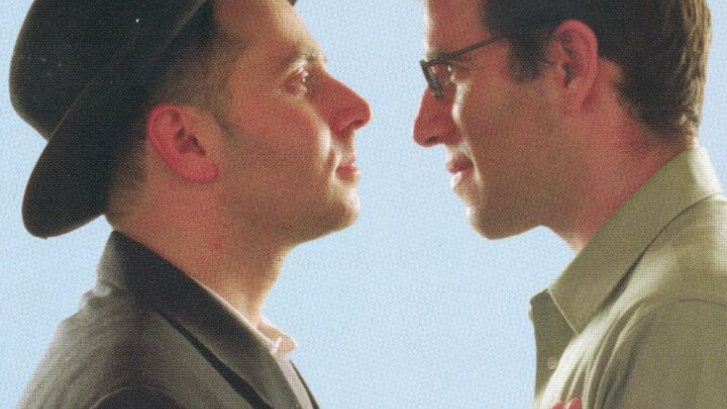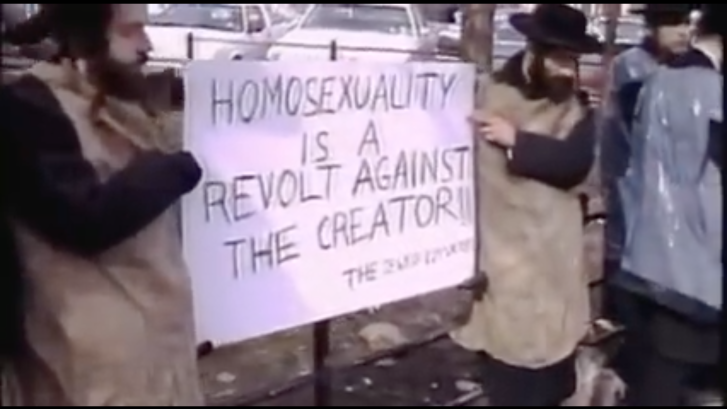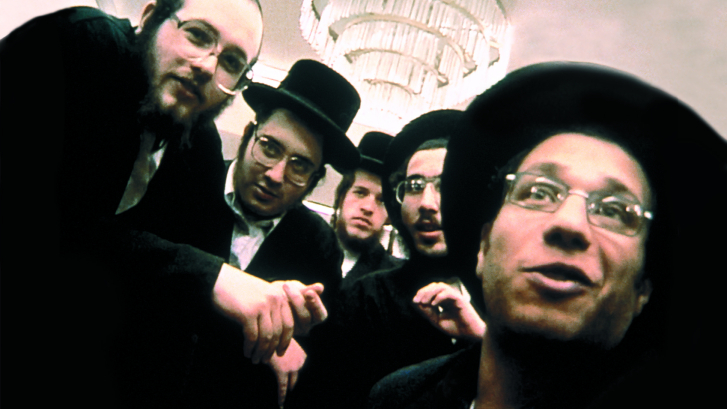Trembling Before G-d

TREMBLING BEFORE G-D is an unprecedented feature documentary that shatters assumptions about faith, sexuality, and religious fundamentalism. Built around intimately-told personal stories of Hasidic and Orthodox Jews who are gay or lesbian, the film portrays a group of people who face a profound dilemma - how to reconcile their passionate love of Judaism and the Divine with the drastic Biblical prohibitions that forbid homosexuality. As the film unfolds, we meet a range of complex individuals - some hidden, some out - from the world's first openly gay Orthodox rabbi to closeted, married Hasidic gays and lesbians to those abandoned by religious families to Orthodox lesbian high-school sweethearts. Many have been tragically rejected and their pain is raw; yet with irony, humor, and resilience, they love, care, struggle, and debate with a thousand-year old tradition. Ultimately, they are forced to question how they can pursue truth and faith in their lives. Vividly shot with a courageous few over five years in Brooklyn, Jerusalem, Los Angeles, London, Miami, and San Francisco, TREMBLING BEFORE G-D is an international project with global implications that strikes at the meaning of religious identity and tradition in a modern world. For the first time, this issue has become a live, public debate in Orthodox circles, and the film is both witness and catalyst to this historic moment. What emerges is a loving and fearless testament to faith and survival and the universal struggle to belong.
Subject background
For the first time, homosexuality has become a live, public debate in Orthodox circles. In just the past five years, a vibrant gay Orthodox community has begun to emerge, moving from isolation to organization. The late 1990's mark a kind of Stonewall for the Orthodox lesbian and gay world through the founding of the Gay and Lesbian Yeshiva/Day School Alumni Association, The Orthodykes and The Tzvi Aryeh AIDS Foundation in New York; the revival of The Orthodykes and the gay Orthodox organization, HOD, in Israel; and the establishment of Jerusalem's first gay and lesbian community center, The Jerusalem Open House. Rabbi Steve Greenberg, the first openly gay Orthodox rabbi, is finishing a book entitled 'Of Wrestling with God and Men' which grapples with The Bible, Jewish tradition and homosexuality. Yet, while the United States and other nations have witnessed an incredible advancement in lesbian and gay civil rights and visibility, Orthodox and Hasidic communities have been largely opposed to homosexuality's being viewed as anything other than sin or sickness. At their worst, the consequences Orthodox gays and lesbians face for 'coming out' inside the community include: Being disowned from families; expulsion from yeshivas and synagogues; forced psychological treatment including attempted conversion to heterosexuality; arranged marriages and subsequent living of double lives; rabbinical courts that separate children from gay and lesbian parents; no access to sexuality education and 'HIV' prevention information; refusal to care for or bury those with AIDS; widespread public condemnation from rabbis and religious media; alcoholism, suicide and self-destructive sexual behavior for those who cannot cope. There is largely public silence around the issue, but there are, however, a number of examples of public condemnation of homosexuality from the Orthodox world. Opinion divides over what exactly the passages in the Torah and Talmud (Rabbinic Teachings) condemn - homosexual relationships or marital ceremonies, specific sexual practices like mishkav zachar (anal sex), or lesbianism at all. In recent years, members of the Orthodox establishment have opposed the gay/lesbian synagogue marching in New York's Salute to Israel Parade and the inclusion of any mention of homosexuals who died in concentration camps in The U.S. Holocaust Museum or New York's Museum of Jewish Heritage. Orthodox politicians and rabbis vehemently testified against 'The New York Gay and Lesbian Civil Rights Bill' in 1986 and New York's Domestic Partnership Bill in 1998 and busloads of right-wing Orthodox Jews and Hasidim protested the hearings. In Israel, Orthodox parties increased their power in the Knesset and hostility within the Knesset against issues such as lesbian and gay domestic partnership, or funding in national health plans for AIDS drugs, has been vocal and uncompromising. In a Sephardic Kabbalistic yeshiva in Jerusalem, an atonement ceremony for homosexuals, adulterers, and masturbators was held complete with tehillim (prayers), ice cubes rubbed on the arms, and shofar-blowing. At the same time, more and more Orthodox rabbis are faced with increasing numbers of congregants and yeshiva students who are coming out as gay and Orthodox families are finding their own harsh views on homosexuality challenged by loved ones. All face an existential crisis of how to hold true to the truth and Divinity of the Torah while not rejecting those who want to help build the people of Israel, yet find themselves to be gay or lesbian. Homosexuality marks a line in the sand that most Orthodox authorities and people will not cross, but hopefully this film will inspire the seeds of change.
About the production
Sometimes you choose films, sometimes films choose you. I began TREMBLING BEFORE G-D out of curiosity, a desire to explore the Orthodox world. I do not think I ever anticipated that such an intense and challenging six years would follow and that the film would set me on a path of spiritual awakening and greater religious observance. I was 24 years old, and had moved back to Brooklyn. I made a gender-blending short video with my 88-year-old grandmother called Tomboychick that went on to have a rich festival, museum, and TV life, and I had a job researching and producing videos about the Christian right-wing for Planned Parenthood. In 1995, I met Mark, the son of an ultra-Orthodox rabbi, at The International Conference of Gay and Lesbian Jews. He was thrown out of seven yeshivas (religious schools) across England and Israel for homosexual activity. By the time I met him, he had abandoned Orthodox practice, and was in and out of the hospital with AIDS-re-lated infections. Mark and I were born nine days apart the same year, and we became like chavruses (study partners) in a yeshiva without walls. He and I went to Jerusalem, where he vowed he would never return, to revisit the yeshiva world he loved, went on religious pilgrimages to the tops of mountains, sought out rabbis and Hasidic rebbes, and filmed. He began to awaken to all he had lost by rejecting that world. I spent the next five years criss-crossing the globe even just trying to locate people and spent thousands of hours becoming part of the simchas (joys) and pain of the incredible Orthodox and formerly Orthodox gays and lesbians I had the privilege of meeting and sharing my life with. It took incredible effort - dozens of screenings in living rooms, innumerable flyers, newspaper ads, TV/print coverage, word-of-mouth, E-mail forwarding, non-stop networking in person and over the Internet. As I met more and more Hasidic and Orthodox gays and lesbians, some thrown out of yeshivas for being gay, others forced into heterosexual marriages, a number disowned and abandoned by their families, it became clear that my level of responsibility and accountability to this deeply hidden community had to be paramount. It was clear that this film could be a vehicle not just of personal exploration, but a powerful catalvst for the birth of a community that would gain a mass public voice for the first time - an exhilarating, if frightening, prospect. My work as a director on TREMBLING BEFORE G-D has been inseparable at times from my role as movement-builder whether as shaliach (messenger), community organizer, referral service, peer counselor - even shad-chan (matchmaker). I helped found a West Coast support group for Orthodox gavs and lesbians in Los Angeles. I introduced the first openly gay Orthodox rabbi to his partner (celebrating two years and counting!) For every brave soul who stepped forward to be filmed, there were more than a hundred unseen hands worldwide shaping this creation. I did not grow up Orthodox, but as a Conservative Jew, and many took me under their wings, and gave me a love of Shabbat, Torah study, prayer, and Orthodox Judaism for which I will be forever grateful. (...)
For many years, I kept inside the community, amassing hundreds of hours of interviews and cinema vérité with a wide range of people. People took incredible risks to be interviewed. One ultra-Orthodox lesbian in Israel, whose husband did not know she was a lesbian, agreed to appear in silhouette with her voice changed, because after twenty years of trying and failing to change to het-erosexuality, she was falling apart. With her identity revealed, she could have jeopardized her own life and welfare as well as the lives of her many children and grandchildren, but she believed so strongly in the project's urgency and necessity, that Orthodox rabbis and families suffer from a total lack of life-affirming information about what it means to be lesbian or gay, that she came forward to tell her story. (...)
At a certain point, it became clear that I would need to confront the Orthodox rabbinic establishment to press for interviews, as I felt by this time I had grounded myself in enough stories that I could be a credible witness to Orthodox gay experiences. It was a project I approached with great trepidation. Filming in ultra-Orthodox communities where most people do not go to movies or own televisions proved to be more complicated at times than the issue of homosexuality. At points, I had to borrow a TV/VCR and secretly bring it to rabbis in Jerusalem to show them clips from the film and convince them to participate. Orthodox women leaders were also very hesitant to break the rules of tsnius (modesty) and speak about how they dealt with lesbianism in such a public medium. Of the fifty rebbeztins (rabbi's wives), female mental health professionals and teachers I approached, only one agreed to come on board the project. (...) The frustration of finding so few people who would come forward to be open to the camera and the impossibility of filming on holy days like the Shabbat forced me to seek creative solutions to representing the unseen. In the winter of 2000, I gathered people to create giant silhouetted tableaux of Orthodox and Hasidic life on a sound stage - from a Hasidic mother and her family lighting Shabbat candles to a lively Orthodox wedding - with the bride and groom and other parts played by Hasidic/Orthodox and ex-Hasidic/Orthodox gays and lesbians and their children. It felt like a beautiful combination of live shadow puppetry and stained glass. The hidden became a revelation and invisibility became illuminated, as the community formed behind the screen to create their image.
details
-
Runtime
85 min -
Country
United States, France, Israel -
Year of Presentation
2001 -
Year of Production
2000 -
Director
Sandi Simcha DuBowski -
Cast
-
Production Company
Simcha Leib Productions, New York -
Berlinale Section
Forum -
Berlinale Category
Documentary-, Essay Film -
Teddy Award Winner
Best Documentary/ Essay Film
pictures from the movie
Biography Sandi Simcha DuBowski
Sandi Simcha DuBowski is a film-maker and writer based in New York. In 1992, DuBowski graduated Magna Cum Laude from Harvard University. His work and writing have appeared in 'New York Times', 'New York Magazine', 'Vogue', 'Filmmaker', 'The Independent', 'Esquire', 'The Boston Globe', 'The Village Voice', 'Out Magazine', 'Planet Out Television', 'The Advocate', 'In The Life TV', 'The Jewish Week', 'The Forward' and 'The Jerusalem Post'. DuBowski's award-winning short, Tomboychick, received the Golden Globe Award for Best Short Documentary at The San Francisco International Film Festival. TREMBLING BEFORE G-D is his first feature-length documentary film.
Filmography Sandi Simcha DuBowski
1993 Tomboychick

